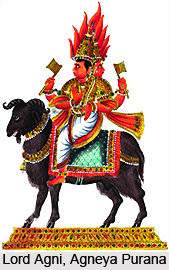 Agneya Purana is amongst the 18 sacred Hindu `Puranas` and is often confused with the Agni Purana which had been composed in various portions of the country during the 19th century. This Indian Purana is believed to have been written by the `Tantriks` keeping in mind the doctrines of a particular sect. Gradually, with the passage of time and the growing popularity of the philosophy of `Tantricism`, the Agneya Purana started gaining importance. Therefore, the original Agneya Purana`s name was finally altered to `Vahni Purana` and it can be noticed inside the Asiatic Society in Kolkata, West Bengal.
Agneya Purana is amongst the 18 sacred Hindu `Puranas` and is often confused with the Agni Purana which had been composed in various portions of the country during the 19th century. This Indian Purana is believed to have been written by the `Tantriks` keeping in mind the doctrines of a particular sect. Gradually, with the passage of time and the growing popularity of the philosophy of `Tantricism`, the Agneya Purana started gaining importance. Therefore, the original Agneya Purana`s name was finally altered to `Vahni Purana` and it can be noticed inside the Asiatic Society in Kolkata, West Bengal.
In the Sanskrit language, `Agneya` means `Daughter of the Fire God` and also `Child of the Fire God Agni`, being a derivation from old Sanskrit texts and Hindu scriptures. Sometimes, `Agneya` has also been referred to as `Agneyi` in certain Sanskrit texts. Lord Agni is greatly revered by the Hindus in India who worship Him ever since the Vedic period and even till the present day. Besides, the name `Agneya` also implies `Goddess of Fire` while it also means `Consecrated from Fire` or `Born from Fire` as per the language of Sanskrit. Agneya had been portrayed as the daughter of Agni as per Hindu mythology and his wife or consort was respectfully referred to as `Svaha` or `Agnayi` meaning wife of Agni.
It is said that saint Angirasa was the son of Agneya, who was amongst the `Seven Great Sages` or `Saptarishis` who was believed to be the main ancestor of the Angirasa lineage of humans. The `Angiris` are known as luminous deities. As per Vishnu Purana, Agneyi or Agneya was also the mother of Khyaati, Sibi, Sumanas, Anga, Kratu apart from Angirasa. According to the theory of `Vaastu Shastra`, Agneya is a Goddess who safeguards the direction of `south-east` and it is believed that kitchens must be created at the south-eastern direction of every household. Even today, Hindus start cooking by offering prayers to Lord Agni and Goddess Agneya to invoke Her divine blessings, especially for the food prepared. About all sorts of Vedic customs and practises commence by worshiping Agneya and the seven heavenly Goddesses or `Dhik Devadais`, who are also respected as `Angel guarding the 8 directions`. Such Vedic rituals offer some of the best practises for sacred good omens.












